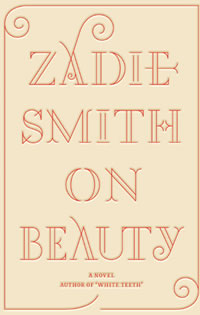 Zadie Smith's third novel, On Beauty, finds the author taking a more straight-ahead approach in comparison to her previous novels (the dynamic and lyrical White Teeth, and the experimental Autograph Man.) Based on the framework of E.M. Forster's Howard's End, On Beauty follows two ideologically different families: the liberal/multicultural Belsey family, and the right-wing ultra-conservative Trinidad/Haitian Kipps family. Through their trials and tragedies (all with written with a comic's touch,) Smith brings to light a couple different issues for debate, one of which is the sociological ramifications to race restitution (which deserves it's own post in and of itself.) The other debate is on critical thought, specifically on art.
Zadie Smith's third novel, On Beauty, finds the author taking a more straight-ahead approach in comparison to her previous novels (the dynamic and lyrical White Teeth, and the experimental Autograph Man.) Based on the framework of E.M. Forster's Howard's End, On Beauty follows two ideologically different families: the liberal/multicultural Belsey family, and the right-wing ultra-conservative Trinidad/Haitian Kipps family. Through their trials and tragedies (all with written with a comic's touch,) Smith brings to light a couple different issues for debate, one of which is the sociological ramifications to race restitution (which deserves it's own post in and of itself.) The other debate is on critical thought, specifically on art.  True criticism, believes the main character Howard Belsey, is not an appreciation but more a question of why people like it, and an explanation of why they shouldn't like it. Howard is a professor who cannot say "I like the tomato" but instead needs to examine it with "What's so beautiful about this tomato? Who decided on its worth?" His criticism of the paintings of Rembrandt is central to both the plot and to the difference between him and fellow professor Montague Kipps. Another major character Carl is a street poet/rapper who is given the opportunity to work in the university library as a "Hip-Hop Archivist" and finds that after collecting and writing about Hip-Hop, he's no longer so much interested in creating it.
True criticism, believes the main character Howard Belsey, is not an appreciation but more a question of why people like it, and an explanation of why they shouldn't like it. Howard is a professor who cannot say "I like the tomato" but instead needs to examine it with "What's so beautiful about this tomato? Who decided on its worth?" His criticism of the paintings of Rembrandt is central to both the plot and to the difference between him and fellow professor Montague Kipps. Another major character Carl is a street poet/rapper who is given the opportunity to work in the university library as a "Hip-Hop Archivist" and finds that after collecting and writing about Hip-Hop, he's no longer so much interested in creating it. It's a common problem that I think a lot of people fall into... looking at things critically can make you like art less, and more importantly, actually engage in the art even less (if at all.) I find this the case in my own world... both periods of my life where I've spent time writing critically about music (and fiction) I find myself being less interested in playing music (or writing fiction.) Every once in awhile though, a piece of music inspires to do, not just listen (or write about) and that's what really gets me 'back in the basement' (so to speak.) My recent surgery on my wrist was finally prompted after this last inspirational attempt proved futile (thumb/wrist pain made it impossible to even form a power chord.) It's a drastic measure to get back to playing but not as drastic as you might think. Howard in the end (Howard's End?) has some resolution to his issue (he's finally able to metaphorically say he likes the tomato) after having an affair that rattles the family - that's certainly a road I'm less willing to take (and not just because my sweetie pie reads this blog.)
 Musically, the novel's soundtrack falls into a lot of what you might expect from what I've written above. Hip-hop, classical, and I've even thrown in (on my own accord) something from Wyclef Jean's important Welcome To Haiti Creole 101, which encapsulates much of the Hatian immigrant issues that have a minor play in the novel.
Musically, the novel's soundtrack falls into a lot of what you might expect from what I've written above. Hip-hop, classical, and I've even thrown in (on my own accord) something from Wyclef Jean's important Welcome To Haiti Creole 101, which encapsulates much of the Hatian immigrant issues that have a minor play in the novel.tags: playlist, books, rhapsody, zadie smith, em forster, wyclef jean, criticism, novel soundtrack
1 comment:
Novel Sndtrck On Beauty
* "Requiem - Lacrimosa" - Wolfgang Amadeus Mozart
* "Trans-Europe Express" - Kraftwerk
* "Hey Ya!" - Outkast
* "Hallelujah" - Leonard Cohen
* "Hallelujah" - Jeff Buckley
* "Ave Verum Corpus" - Wolfgang Amadeus Mozart
* "Pride" - U2
* "Brothers Gonna Work It Out" - Public Enemy
* "Cross Road Blues" - Robert Johnson
* "24 E Tan Pou Viv" - Wyclef Jean
Post a Comment